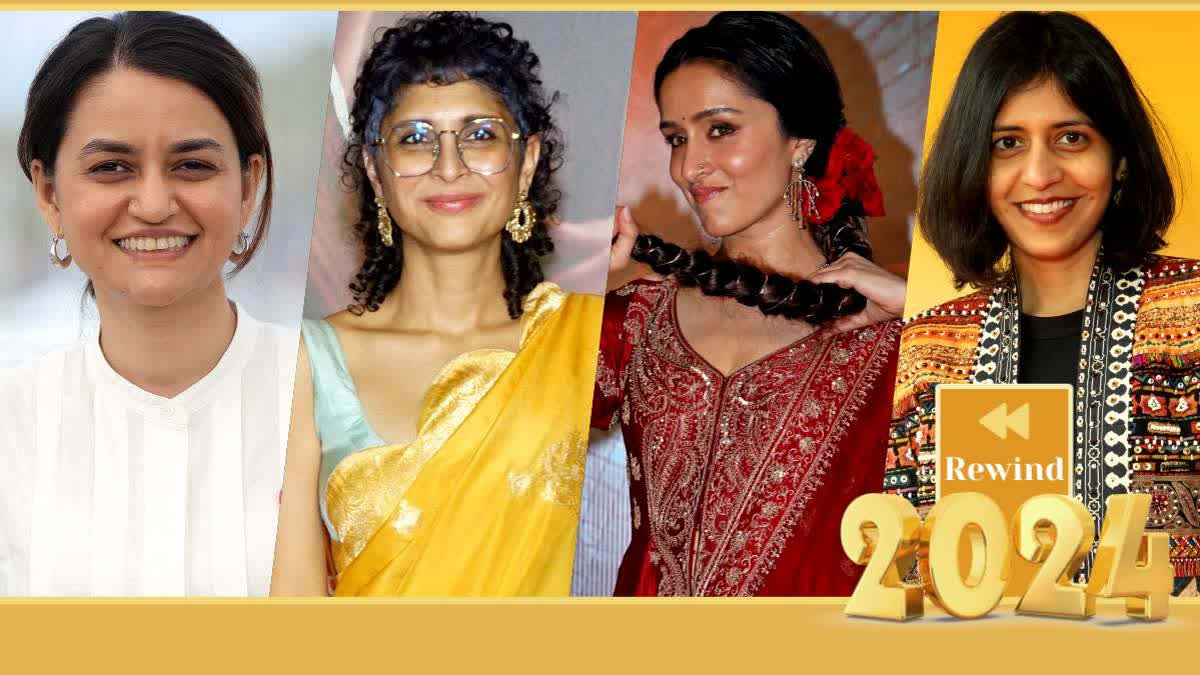Women in cinema were on top form in 2024. This year witnessed a huge change in the cinema landscape with more female directors and a wider range of female characters coming to life on screen. A plethora of films made headlines for their individuality, all thanks to the women who stood behind them. From Payal Kapadia’s All We Imagine as Light winning the prestigious Grand Prix at the Cannes Film Festival to Kiran Rao’s Laapataa Ladies being selected as India’s official entry for the Oscars, 2024 put women filmmakers in the spotlight. It was a breakthrough moment for Indian women on the international stage. Kapadia was further declared the first Indian woman to be nominated for a Golden Globes, then Anasuya Sengupta bagged the Best Actress award at Cannes, these dazzling discoveries tell the success of Indian women on a global platform. The first Indian woman director to achieve this feat, Kapadia's film broke a 30-year dry spell for Indian films in the Cannes Competition Section. While Kapadia’s film delves into the lives and desires of two nurses and various aspects of womanhood through a feminist lens, Sengupta, the powerhouse of talent, bagged the trophy for the portrayal of Renuka in The Shameless that explores forbidden love, caste dynamics, and religious turmoil.
Kapadia, Sengupta and Rao are not the only women who created significant impressions at top Festivals, there are many more who challenged the deep-rooted gender biases within the film industry and society at large. In the Un Certain Regard category at the Cannes Film Festival was the movie Santosh, directed by British-Indian filmmaker Sandhya Suri starring Shahana Goswami and Sunita Rajwar. In this story, a young woman, in a sudden turn of events, is compelled to take on her husband’s job as a police constable who dies in a riot. Radhika Apte plays the character of Uma in Karan Kandhari’s film Sister Midnight, about a newly-wed couple’s life and relationship in a small, stuffy Mumbai apartment. A dark comedy, the film premiered at the Cannes’ Director’s Fortnight segment. These films, all in their own way, champion the female gaze.
Further, Rima Das’ sequel to her acclaimed 2017 film, Village Rockstars 2, bagged the Kim Jiseok award in Busan. Shuchi Talati’s debut feature and mother-daughter drama Girls Will Be Girls set the tone by winning the audience award in the World Cinema Dramatic Competition at the Sundance Film Festival while its 22-year-old lead actress, Preeti Panigrahi, bagged the special jury award for acting. Produced by Richa Chadha and Ali Fazal's Pushing Buttons Studios, the film is a compelling story set in a boarding school in a small Himalayan hill town in northern India. It follows the journey of Mira, a 16-year-old girl whose rebellious awakening is intertwined with her mother's unfulfilled coming-of-age experiences. Talati says 2024 is an incredible year for independent Indian women filmmakers. “It has been a landmark year... I am sure it has been some kind of a coincidence that all these films like Laapataa Ladies, Village Rockstars 2, Santosh, All We Imagine as Light ..came out in the same year ...we collectively created a tapestry of stories that have not been given space in our culture. But whether next year we will again have these many women and many great films by women we don’t know but definitely this is part of an overall trend of more cinema made by women and I am very excited to be a part of this,” says Talati from New York in an exclusive chat with ETV Bharat.
Rao’s Laapataa Ladies, a satire exploring feminism and patriarchy through a unique lens may have not made it to the Academy Awards shortlist but it has been the most talked about film of 2024 and then to be included in this prestigious process alongside some of the finest films from across the world is an honor in itself. Rao’s return to filmmaking after over a decade, is a delightful tale of two veiled brides who get mistakenly swapped in a crowded train compartment, and all that ensues thereafter. Rao strongly believes that women-centric films are underrepresented in the Indian film industry. “Women are carving out a space for themselves in film, but there is still a need for more women in the industry. There is a need to invest more in women storytellers, producers, and actors. I will continue to tell stories revolving around interesting female characters,” she says.
